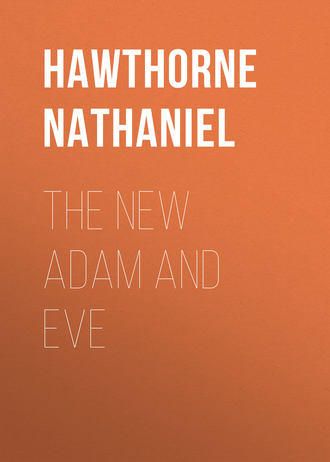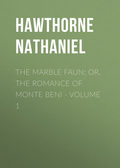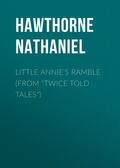
Натаниель Готорн
The New Adam and Eve
Passing from the interior of the prison into the space within its outward wall, Adam pauses beneath a structure of the simplest contrivance, yet altogether unaccountable to him. It consists merely of two upright posts, supporting a transverse beam, from which dangles a cord.
“Eve, Eve!” cries Adam, shuddering with a nameless horror. “What can this thing be?”
“I know not,” answers Eve; “but, Adam, my heart is sick! There seems to be no more sky, – no more sunshine!”
Well might Adam shudder and poor Eve be sick at heart; for this mysterious object was the type of mankind’s whole system in regard to the great difficulties which God had given to be solved, – a system of fear and vengeance, never successful, yet followed to the last. Here, on the morning when the final summons came, a criminal – one criminal, where none were guiltless – had died upon the gallows. Had the world heard the footfall of its own approaching doom, it would have been no inappropriate act thus to close the record of its deeds by one so characteristic.
The two pilgrims now hurry from the prison. Had they known how the former inhabitants of earth were shut up in artificial error and cramped and chained by their perversions, they might have compared the whole moral world to a prison-house, and have deemed the removal of the race a general jail-delivery.
They next enter, unannounced, but they might have rung at the door in vain, a private mansion, one of the stateliest in Beacon Street. A wild and plaintive strain of music is quivering through the house, now rising like a solemn organ-peal, and now dying into the faintest murmur, as if some spirit that had felt an interest in the departed family were bemoaning itself in the solitude of hall and chamber. Perhaps a virgin, the purest of mortal race, has been left behind to perform a requiem for the whole kindred of humanity. Not so. These are the tones of an Eolian harp, through which Nature pours the harmony that lies concealed in her every breath, whether of summer breeze or tempest. Adam and Eve are lost in rapture, unmingled with surprise. The passing wind, that stirred the harp-strings, has been hushed, before they can think of examining the splendid furniture, the gorgeous carpets, and the architecture of the rooms. These things amuse their unpractised eyes, but appeal to nothing within their hearts. Even the pictures upon the walls scarcely excite a deeper interest; for there is something radically artificial and deceptive in painting with which minds in the primal simplicity cannot sympathize. The unbidden guests examine a row of family portraits, but are too dull to recognize them as men and women, beneath the disguise of a preposterous garb, and with features and expression debased, because inherited through ages of moral and physical decay.
Chance, however, presents them with pictures of human beauty, fresh from the hand of Nature. As they enter a magnificent apartment they are astonished, but not affrighted, to perceive two figures advancing to meet them. Is it not awful to imagine that any life, save their own, should remain in the wide world?
“How is this?” exclaims Adam. “My beautiful Eve, are you in two places at once?”
“And you, Adam!” answers Eve, doubtful, yet delighted. “Surely that noble and lovely form is yours. Yet here you are by my side. I am content with one, – methinks there should not be two.”
This miracle is wrought by a tall looking-glass, the mystery of which they soon fathom, because Nature creates a mirror for the human face in every pool of water, and for her own great features in waveless lakes. Pleased and satisfied with gazing at themselves, they now discover the marble statue of a child in a corner of the room so exquisitely idealized that it is almost worthy to be the prophetic likeness of their first-born. Sculpture, in its highest excellence, is more genuine than painting, and might seem to be evolved from a natural germ, by the same law as a leaf or flower. The statue of the child impresses the solitary pair as if it were a companion; it likewise hints at secrets both of the past and future.
“My husband!” whispers Eve.
“What would you say, dearest Eve?” inquires Adam.
“I wonder if we are alone in the world,” she continues, “with a sense of something like fear at the thought of other inhabitants. This lovely little form! Did it ever breathe? Or is it only the shadow of something real, like our pictures in the mirror?”
“It is strange!” replies Adam, pressing his hand to his brow. “There are mysteries all around us. An idea flits continually before me, – would that I could seize it! Eve, Eve, are we treading in the footsteps of beings that bore a likeness to ourselves? If so, whither are they gone? – and why is their world so unfit for our dwelling-place?”
“Our great Father only knows,” answers Eve. “But something tells me that we shall not always be alone. And how sweet if other beings were to visit us in the shape of this fair image!”
Then they wander through the house, and everywhere find tokens of human life, which now, with the idea recently suggested, excite a deeper curiosity in their bosoms. Woman has here left traces of her delicacy and refinement, and of her gentle labors. Eve ransacks a work-basket and instinctively thrusts the rosy tip of her finger into a thimble. She takes up a piece of embroidery, glowing with mimic flowers, in one of which a fair damsel of the departed race has left her needle. Pity that the Day of Doom should have anticipated the completion of such a useful task! Eve feels almost conscious of the skill to finish it. A pianoforte has been left open. She flings her hand carelessly over the keys, and strikes out a sudden melody, no less natural than the strains of the AEolian harp, but joyous with the dance of her yet unburdened life. Passing through a dark entry they find a broom behind the door; and Eve, who comprises the whole nature of womanhood, has a dim idea that it is an instrument proper for her hand. In another apartment they behold a canopied bed, and all the appliances of luxurious repose. A heap of forest-leaves would be more to the purpose. They enter the nursery, and are perplexed with the sight of little gowns and caps, tiny slices, and a cradle, amid the drapery of which is still to be seen the impress of a baby’s form. Adam slightly notices these trifles; but Eve becomes involved in a fit of mute reflection from which it is hardly possible to rouse her.
By a most unlucky arrangement there was to have been a grand dinner-party in this mansion on the very day when the whole human family, including the invited guests, were summoned to the unknown regions of illimitable space. At the moment of fate, the table was actually spread, and the company on the point of sitting down. Adam and Eve come unbidden to the banquet; it has now been some time cold, but otherwise furnishes them with highly favorable specimens of the gastronomy of their predecessors. But it is difficult to imagine the perplexity of the unperverted couple, in endeavoring to find proper food for their first meal, at a table where the cultivated appetites of a fashionable party were to have been gratified. Will Nature teach them the mystery of a plate of turtle-soup? Will she embolden them to attack a haunch of venison? Will she initiate them into the merits of a Parisian pasty, imported by the last steamer that ever crossed the Atlantic? Will she not, rather, bid them turn with disgust from fish, fowl, and flesh, which, to their pure nostrils, steam with a loathsome odor of death and corruption? – Food? The bill of fare contains nothing which they recognize as such.







